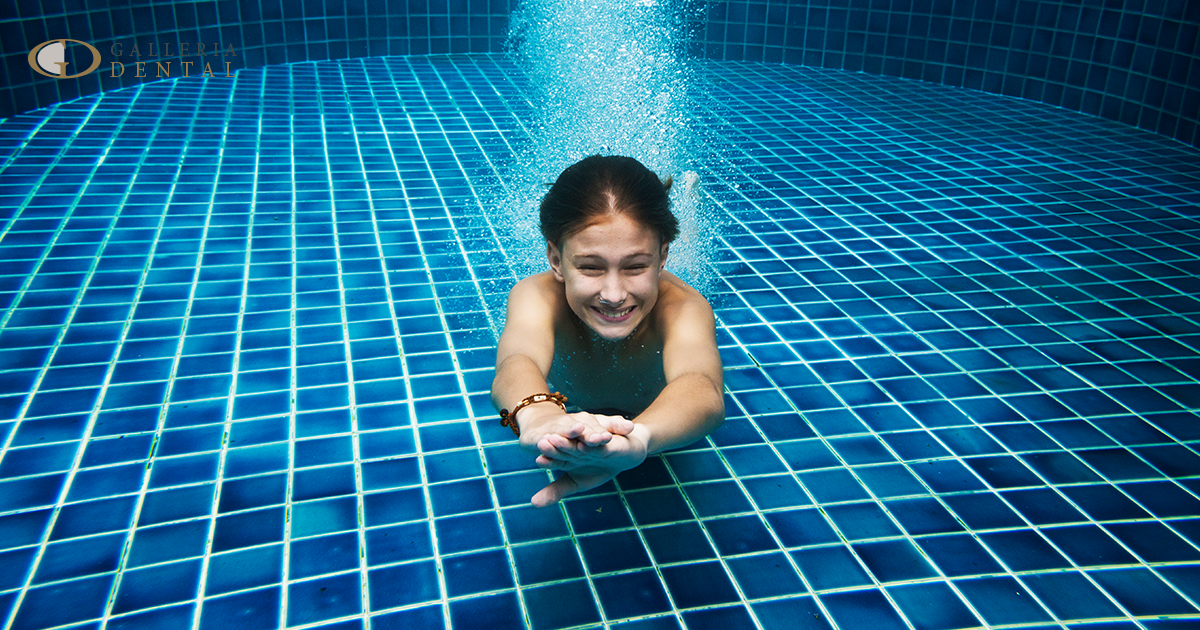
February 4, 2021
Summertime Smiles: Does Swimming Affect Your Teeth?
Sunblock? Check. Lifeguard within the premises? Check. Swimming safety protocols in place? Check. Dental health protection? Yes, you’ll need that too if you plan to spend a lot of time in chlorinated waters during this sunny season.
For many people, summertime means spending endless hours relaxing, exercising, and simply having fun at the pool — certainly, while following the necessary health and safety measures. But did you know that swimming safety measures should also include taking care of your teeth?
Can swimming harm your teeth?
Swimming can pose risks to your dental health, whether you’re an avid swimmer, a dedicated athlete or a recreational swimmer. From exposure to incorrectly treated pool water to potential mouth injuries while engaging in water sports, here are a few considerations you need to keep in mind when it comes to swimming and your teeth.
Swim only in properly maintained pools.
Several studies have shown how exposure to overly chlorinated water can cause harm to the teeth. Too much chlorine and the improper composition of chemical disinfectants can make the pool water highly acidic. Acidic waters, when in frequent contact with your teeth, can start to eat away at the tooth enamel, cause tooth structure to weaken and lead to discolouration.
Some of the dental issues that can be caused or triggered by frequent swimming in over-chlorinated pools include:
– Teeth stains
– Dental pain
– Calculus formation
– Dental corrosion
– Teeth sensitivity
These negative effects are mostly seen in competitive swimmers who need to stay in the water several hours per week. But active recreational swimmers also need to take note as it takes only 27 days exposure for effects to show. Moreover, once the erosion reaches your tooth enamel’s healthy mineral, the damage can become irreversible.
To avoid damage to your teeth, swim only in pools that adhere to proper water treatment standards that ensure the right pH balance and chlorine levels in the water. Stay away from over-chlorinated pools (erosion of surfaces around the pool is a tell-tale sign of too high water acidity). If you have your pool at home, get help from a specialist on the proper maintenance, application and monitoring of chemical disinfectants.
Protect your dental appliances.
Retainers and other dental appliances might pry loose while you’re swimming and engaging in water activities. Moreover, some dental appliances consist of plastic and other materials that can incur damage when exposed to chemically treated water. If this is the case, the safe option is to take them off and store them in a clean container before you hit the water.
Meanwhile, you can rely on full and partial dentures, if fitted and made well, to stay in place even if you wear them during swimming. For double protection and confidence, you may add dental adhesive before your swim.
Be alert and take precautions against accidents.
Walk slowly along the poolside as tiles and wet floor surfaces can cause slips and falls that lead to mouth and tooth injuries. Teach kids swim and dive techniques that will help them avoid hitting the hard tiles or pool floor. Meanwhile, if you’re planning to engage in high-contact water sports and activities such as beach/water volleyball or water polo, protect your lips and teeth and wear a mouthguard if necessary.
Visit the dentist before a deep dive.
When teeth are subjected to high pressure (such as during underwater diving), dental pain can occur. This is called barodontalgia, characterised by acute pain in the teeth and sinuses due to changes in ambient pressure.
However, this pain can also be caused or multiplied by the presence of dental conditions such as infections, caries, dental cysts, damaged restorations or deteriorating dental fillings. Whether or not you’re planning to go deep diving, it’s best to have your oral health checked by dental professionals so you can avoid dental pain and avoidable emergency dental situations while you’re enjoying the season.
Schedule your summer dental check-up.
Depending on your oral hygiene habits and swimming routine, your dentist might prescribe additional steps to further protect your teeth from chlorine water exposure, such as:
– Interdental cleaning
– A new dental regimen such as the use of prescription fluoride toothpaste, mouth rinse, varnish or gel
– Individualised toothbrushing schedule before and after swimming
– The use of a power toothbrush
– Chewing xylitol gum
– Further clinical examinations
Every mouth and client is unique. That’s why it’s important to get regular dental check-ups so you dentist can consider all the specific factors that can affect your oral health this summer — from your medical and dental history, to the current state of your teeth, to your diet and lifestyle, right down to how many times you swim in a given period.
References:
https://www.colgate.com/en-us/oral-health/threats-to-dental-health/the-effects-of-chlorine-on-your-teeth
https://pubmed.ncbi.nlm.nih.gov/3953542/
https://www.sahealth.sa.gov.au/wps/wcm/connect/public+content/sa+health+internet/public+health/water+quality/swimming+pools+and+recreational+waters/spa+pools+maintaining+your+spa+at+home
With your diligent care for your teeth and the help of your dentist, you’ll be able to swim to your heart’s delight without worries this summer. Should you have any questions about taking good care of your teeth, don’t hesitate to talk to our friendly dental team [link to the clinic’s contact page]. We’ll be happy to help!
